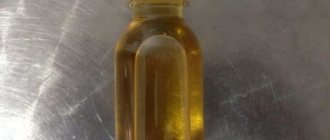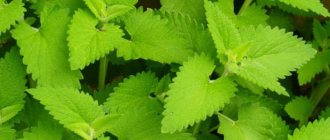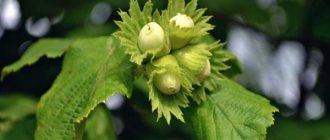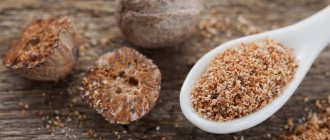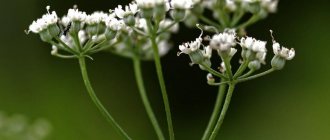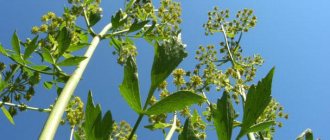Meadowsweet grass is a unique plant and has been used for many years not only for medicinal purposes, but also for preparing a delicious drink with a taste of honey, which has no less useful qualities. If you turn to the medical literature, you can find many references to this wonderful plant, most of the information is about the content of vitamins and substances that have a beneficial effect on the body. What diseases can meadowsweet help with, its beneficial properties and contraindications, and the peculiarities of preparing medicines based on it – these are the main questions that arise among admirers of traditional medicine.
What is the value of meadowsweet grass, medicinal properties
It is not for nothing that the wonderful meadowsweet plant has become famous among the common people; its beneficial properties and contraindications have been studied for years, and it has been used against many ailments. Even today it does not lose popularity and is widely used in folk medicine. What determines such prevalence of the plant among admirers of unconventional methods of treatment?
Meadowsweet, medicinal properties:
- impact on microbes that have entered the body, because the herb is a natural antiseptic;
- tannins help fight pain and high fever;
- some substances can stop bleeding;
- beneficial effects on heart disease;
- increasing the body's immune forces;
- elimination of inflammatory processes;
- strengthening blood vessels;
- slowing down aging;
- elimination of swelling and allergic manifestations.
Regular use of decoctions and infusions has a beneficial effect on the nervous system, relieves insomnia and mental disorders.
Meadowsweet: contraindications
Speaking about the medicinal properties and contraindications of meadowsweet, you first need to focus on the latter:
- In case of overdose, as with any other drug, an allergic reaction may occur. Intolerance is also likely in people who are allergic to aspirin. In this case, ear noise, mild nausea and even bleeding will be observed. True, the risk of such a phenomenon occurring is quite low;
- When weighing the benefits and harms of meadowsweet, you should stop using it when blood clotting is quite poor. Otherwise, the salicylates contained in the plant will thin the blood even more;
- Children under 16 years of age should, in principle, treat any medications with caution. The risk that meadowsweet will cause harm increases if the growing body is susceptible to chickenpox or influenza;
- It should be avoided by those suffering from asthma. The fact is that meadowsweet can serve as a stimulus for the appearance of bronchial spasms;
- It is necessary to look for another method of treatment for those who are prone to constipation. Especially if this problem is chronic;
- are also at risk . Some experts recommend caution for hypertensive patients. In other words, any problems with blood pressure should alert you.
For asthma, consuming lemon balm will be beneficial. Melissa is a medicinal plant, which is popularly called wild or catnip and is quite often confused with other species of the Lamiaceae family. The leaves of the plant smell pleasantly of lemon with a slight mint bitterness and act on humans as a natural sedative.
People with blood pressure problems should not consume meadowsweet.
What meadowsweet grass looks like, photo
For rural residents who know the surrounding area well, it will not be difficult to stock up on valuable raw materials for a long time. For city dwellers, everything is a little more complicated, because even walking next to a plant, they are unlikely to guess what storehouse of useful substances they encountered on their way. A photo will help you figure out what type of meadowsweet it is, thanks to which you can easily recognize the grass.
Meadowsweet, the beneficial properties and contraindications of which have long been no secret to anyone, loves to grow in swampy areas, prefers water meadows or damp ravines, and can be found near almost every body of water. There is no particular decorative feature to be found in the grass; the only thing that distinguishes it is the fluffy panicles-inflorescences and the delightful smell associated with honey.
The plant easily grows up to one and a half meters in height, so it is quite easy to spot. Flowers will also give you hints about the location of the thickets - during flowering the shrub resembles a snowdrift.
The stems are quite powerful, branching only in the upper part of the plant. The leaves are a little reminiscent of elm leaves, which is why the common people often call the grass meadowsweet. Flowers and rhizomes are usually used for treatment. They must first be dried; in this form, the raw materials can be stored for up to 5 years.
Best before date
24 months
Vitamins with similar effects
- Maxiflorum with Valerian (Oral tablets)
- Incas gold. Men's Formula (Oral Tablets)
- Encaps (Capsule)
- Influence (Capsule)
- Set of herbs No. 4 (Oral tablets)
- Narosan Orange (Oral liquid)
- Marine calcium for children with iron (Oral tablets)
- Marine calcium for children with manganese (Oral tablets)
- Pankramin (Powder for oral solution)
- Pantohematogen "Altamar™-1" (Capsule)
The description of vitamin Meadowsweet is intended for informational purposes only. Before starting to use any drug, it is recommended to consult a doctor and read the instructions for use. For more complete information, please refer to the manufacturer's instructions. Do not self-medicate; EUROLAB is not responsible for the consequences caused by the use of information posted on the portal. Any information on the project does not replace consultation with a specialist and cannot be a guarantee of the positive effect of the drug you use. The opinions of EUROLAB portal users may not coincide with the opinions of the site Administration.
Are you interested in vitamin Meadowsweet? Do you want to know more detailed information or do you need a doctor's examination? Or do you need an inspection? You can make an appointment with a doctor - the Euro lab is always at your service! The best doctors will examine you, advise you, provide the necessary assistance and make a diagnosis. You can also call a doctor at home . Euro lab clinic is open for you around the clock.
Attention! The information presented in the vitamins and dietary supplements section is intended for informational purposes and should not be a basis for self-medication. Some of the drugs have a number of contraindications. Patients need to consult a specialist!
If you are interested in any other vitamins, vitamin-mineral complexes or dietary supplements, their descriptions and instructions for use, their analogues, information about the composition and form of release, indications for use and side effects, methods of use, dosages and contraindications, notes about the prescription of the drug for children, newborns and pregnant women, price and consumer reviews, or you have any other questions and suggestions - write to us, we will definitely try to help you.
Medicinal herb meadowsweet, how to use it for diseases
Due to its remarkable properties, the plant can be used both for the treatment of ailments and for preventive purposes. What diseases can meadowsweet, a medicinal herb, cure?
You can use plant materials against the following body problems:
- colds;
- flu, pneumonia, sore throat;
- heart ailments;
- haemorrhoids;
- high blood pressure;
- blood clot formation;
- inflammation in polyarthritis, arthritis, arthrosis;
- diseases of the digestive tract (diarrhea, ulcers, dysentery);
- skin lesions (long-term non-healing wounds, lichen, herpes).
The herb can also be used to treat women’s diseases; in addition, it copes well with mental disorders. The main thing is to choose the right form of home medicine, because traditional medicine provides recipes not only for decoctions, but also for aromatic tea, tinctures and even ointments from this useful plant.
Indications for use of Meadowsweet
Meadowsweet is used for: psoriasis, cardiac edema, intestinal and gastric polyps, herpes, infertility, hepatitis, diseases of the stomach, kidneys, bladder, intestinal atony, sore throat, respiratory diseases, influenza, bronchial asthma, cancer, pneumonia, bronchitis.
The natural properties of Meadowsweet make it possible to use the herb for neurological diseases, arthritis, arthrosis, rheumatism, neuritis of the facial nerve, inflammation of the sciatic nerve, epilepsy, neuritis of the trigeminal nerve, intercostal neuralgia.
The use of Meadowsweet is effective for trophic ulcers, to relieve fever and inflammation.
What properties does meadowsweet honey have?
Honey from meadowsweet is a remedy that has not lost its value for hundreds of years, because this fragrant substance with a unique aroma is famous for its special qualities. The plant is an excellent honey plant, and during flowering, bees from all over the area flock to it to stock up on this delicious product.
The shade of honey is slightly different from the golden bee product that everyone is used to seeing on store shelves. The product has unique qualities that must certainly be used to combat various diseases.
A bee product extracted from meadowsweet can relieve painful sensations, and it can be used not only internally, but also for compresses or lotions. You can treat ulcers, inflammation, kidney and stomach diseases. It will also be useful for women’s ailments - thrush or inflammation of the cervix.
Honey is especially valuable against colds. With its help, you can quickly get rid of high fever, relieve irritation in the throat, relieve cough and even suppress attacks of fever.
What ailments does it help with?
The use of meadowsweet in folk medicine is actively used for the following ailments:
- Stomach ulcer - in this case, the astringent property of the plant will come in handy. It will be able to properly protect and tone the gastric walls. Food will begin to be digested better, and the discomfort will go away. The risk of re-infection will also be significantly reduced due to the antimicrobial properties of this representative of the flora. Acidity decreases;
- The beneficial properties of fireweed tea with meadowsweet are especially useful for other ailments that interfere with the normal functioning of the gastrointestinal tract. For example, you can get rid of heaviness in the stomach, gastritis, diarrhea. Treatment with meadowsweet itself does not cause any discomfort - the tincture from it tastes pleasant;
- For headaches , the remedy is useful because it helps normalize blood circulation. Pain of both the chronic dull type and the shooting type can be treated. There is a feeling of cooling;
- The medicinal properties of meadowsweet will also be useful for those who suffer from rheumatism. The inflammation will subside fairly quickly. As well as chronic pain associated with this unpleasant illness;
- During diseases that are in the nature of a cold, the medicinal plant meadowsweet can relieve high fever. The pores expand and heat is better released from the body. It is only important to use the product regularly for such an effect.
Pine needles will also help cure stomach ulcers. They contain tannins that have an anti-inflammatory effect.
For rheumatism, we also recommend using such remedies as celandine, cinquefoil, sea buckthorn and St. John's wort.
For more information about what meadowsweet treats, watch the video:
Meadowsweet tea, benefits and harms
Most often, meadowsweet tea is used for preventive purposes, the benefits and harms of which were established many years ago. You can safely use the drink against colds - it will significantly alleviate the condition.
Preparation of the drink:
- 15 gr. Pour boiling water (250 ml) over the flowers of the plant.
- Cover the container with a lid and leave for a quarter of an hour.
- Strain the liquid, you can add honey, but not necessarily.
You should drink tea made from this herb only in small sips, and be sure to retain the liquid in your mouth. This will not only allow you to feel an aromatic bouquet of delicious taste, but also have a healing effect on inflammatory processes on the gums or relieve toothache.
Can the drink be harmful? Despite numerous studies, no allergens have been identified in it, so you can consume it without fear. The only thing doctors recommend is not to drink it during pregnancy and with chronic diseases. If you have poor blood clotting, it is also better to refrain from drinking tea.
Meadowsweet honey
A decoction prepared from the rhizome is indicated for cancer, but only along with drug therapy. There are different herbal remedies. A decoction of meadowsweet will help eliminate the symptoms of respiratory diseases literally within a day. It also has antiparasitic properties. For gastrointestinal disorders, the product can be used for cleansing enemas.
Externally, the decoction helps with boils, ulcers and ulcers. The product is easy to prepare, so the process will not take much time. You will need:. The flowers must first be crushed and poured into a glass container. Further preparation steps are as follows:
Newsletter
The infusion is prepared a little easier - simply pour boiling water over a certain amount of herb, and then leave it for a couple of hours or days, depending on the recipe. For such a remedy you will need meadowsweet roots. In the form of an infusion, they help with joint diseases and even oncology. The product is prepared according to the following instructions: Meadowsweet tea not only quenches thirst, but also fills the body with natural minerals and vitamins. It brings particular benefits in combination with honey. In this case, the medicinal properties of meadowsweet are more fully manifested.
Brewing herbs as tea is very simple:. To treat wounds, especially those that do not heal for a long time, it is more convenient to use meadowsweet in the form of an ointment. To make it, the rhizomes of the plant are often used.
In addition to them, you will need grams of regular Vaseline. It needs to be mixed with h.
Meadowsweet root, medicinal properties and proper use
All parts of the plant can be used for treatment, and meadowsweet root, the medicinal properties of which are almost as good as the beneficial qualities of flowering, can be used against many ailments. Usually, products based on it are used against high blood pressure, gout, and kidney diseases.
Preparation of the product:
- Wash and grind 15 g. dry rhizomes.
- Pour boiling water (500 ml) over the prepared plant material and place in a water bath.
- Let the mixture sit for about half an hour at a low boil.
- Infuse the product for an hour, be sure to leave the lid closed.
- Strain and add boiled water to the original volume.
Take the product three times a day, only 25 ml at a time. It is recommended to do this only after eating. You can add a small amount of sugar or diversify the taste with good honey.
Ointment from the rhizome can be used to treat wounds, burns and all types of dermatitis. It’s easy to prepare – grind the roots into powder (20 g), mix with butter (90 g). Use the product for rubbing or compresses several times a day. You can also use it to affect sore joints, but it is better to do this after prior consultation with your doctor.
Meadowsweet, whose beneficial properties and contraindications are so diverse, is not in vain considered one of the most popular plants in folk medicine, because this herb can cope with a considerable number of diseases. You should not avoid the wonderful effects - even simple tea will have a beneficial effect on your health and improve your well-being.
Source
Chemical composition of meadowsweet
The meadowsweet plant is popular in folk medicine for a reason. The perennial contains many useful substances, namely:
- ascorbic acid;
- flavonoids kaempferol and quercetin;
- tannins;
- heparin;
- polyphenols - caffeic and ellagic acids;
- essential oils;
- glycosides isosalicin, monotropitine and spirein;
- vanillin and methyl salicylate;
- fatty acid;
- wax and starch;
- Kakhetians.
The main value in meadowsweet is salicylic acid and its derivatives. Thanks to these components, the plant acquires pronounced anti-inflammatory and analgesic properties.
